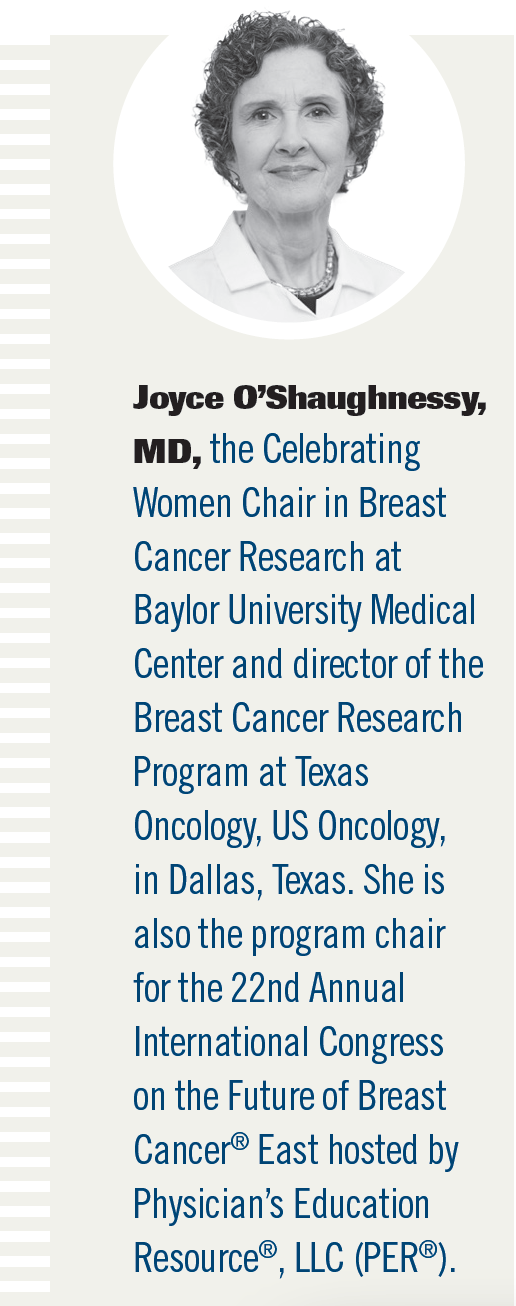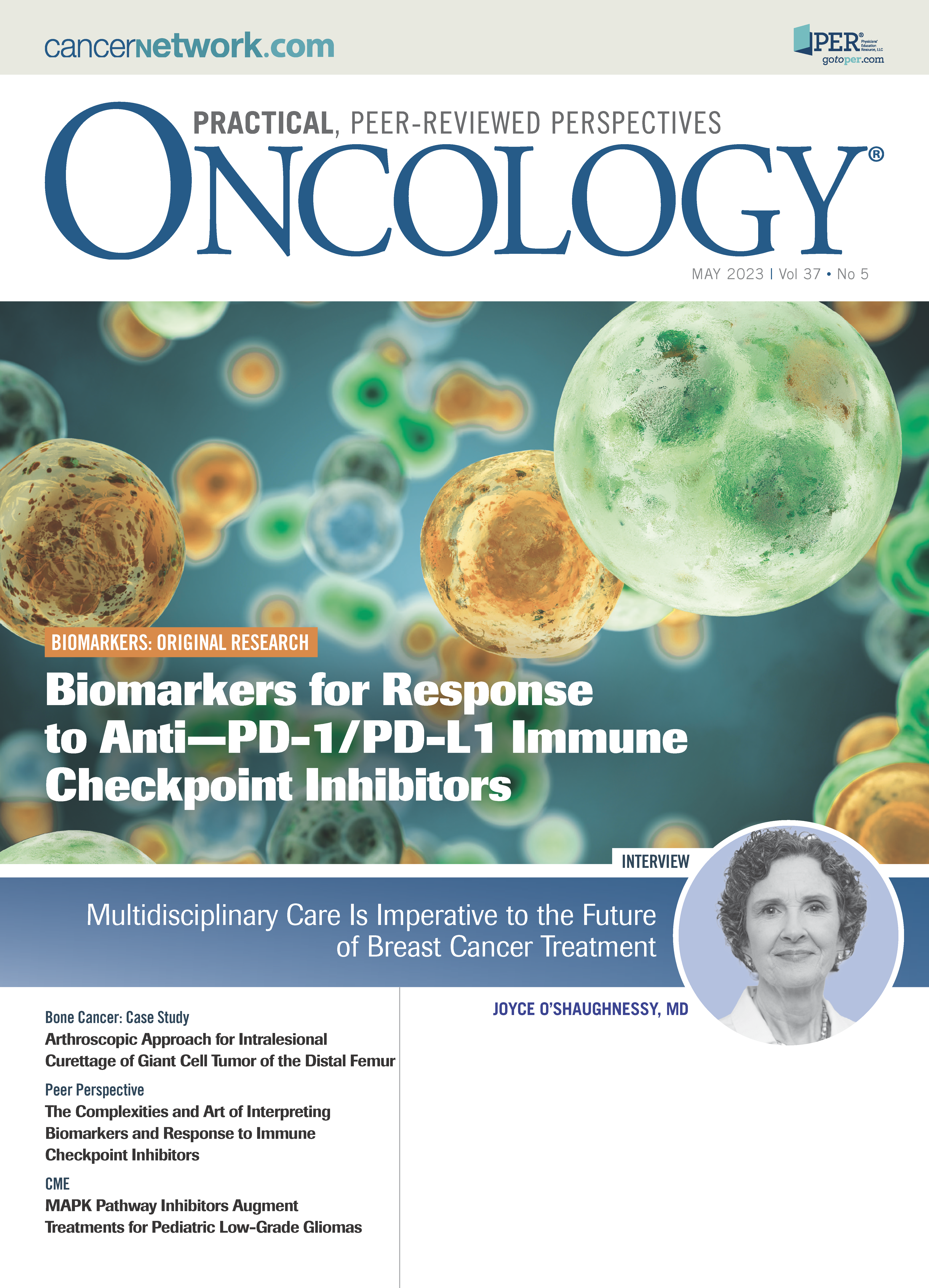Multidisciplinary Care Is Imperative to the Future of Breast Cancer Treatment
“Sometimes we have to advocate, but mostly we have to hire experts in our practice who can access these agents through free assistance programs, partial assistance, copay assistance, etc. That is an effort, a big part of the infrastructure and practices, to be able to access therapies.”

Prior to the 22nd Annual International Congress on the Future of Breast Cancer East, ONCOLOGY spoke with Joyce O’Shaughnessy, MD, regarding the importance of multidisciplinary cancer-focused treatments for patients with breast cancer.
O’Shaughnessy also spoke about how insurance can be a barrier to patients receiving the care they need and touched upon why she enjoys this meeting so much and how it brings together expert opinions in the industry.
Q: How important is multidisciplinary care in the breast cancer space?
O’SHAUGHNESSY: As I always tell my patients, breast cancer treatment and management [are] always 2 parts. You’ve got to take optimal care of the local regional area, the breast itself, and the surrounding lymph node beds. You’ve got to get control of the disease; you never want to see it back again. You also have to have restoration; you [have] to have reconstruction. In some cases, not everybody needs that. That’s very important to be done [for] the patient’s health and overall well-being, but [it is] critically important for breast cancer control.
Then you have your systemic management. What [are] the chances that the breast cancer has already metastasized? Or in the case of metastatic disease, managing overt disease, there are still multidisciplinary issues around who could still benefit from the [surgical] management of the primary [site of disease]. How could patients benefit from radiation management of the primary [site of disease] as well as palliative radiation approaches or surgical approaches [for] the patient with metastatic disease? We’ve always got dual goals, local regional management or management of a particularly morbid sight of metastatic disease, as well as general systemic management.
Q: When do you decide to bring the entire multidisciplinary team into the picture?
O’SHAUGHNESSY: Patients will usually see surgical and medical oncologists immediately after diagnosis, particularly if they have stage II or III disease. For stage I disease, patients may simply begin with the surgeon, [who will] then bring the medical oncologist and the radiation oncologist in if the patient clearly needs to go to surgery first. Otherwise, though, the surgeon will reach out to the radiation oncologist and medical oncologist to get their consultation sooner than later. Most of us have weekly tumor boards, [during which] we will get a multidisciplinary discussion of patients, either all patients or controversial patients [for whom] you need to hear, “OK, there are some different options here. What should we do? What [does] the team think is the best approach for this patient?”
Q: What are some barriers to optimal care in this space?
O’SHAUGHNESSY: Most patients have insurance, either federal insurance, insurance to exchange, Medicaid, government insurance, Medicare, or commercial insurance. Within the world of insured patients, barriers [include] how fast we can get the patients in and [seen and treated]. All of us in our practices are very aware that we all generally have internal goals of seeing a new patient within a week to have that initial diagnosis. The other barrier is access to therapies—expensive therapies, systemic therapies, and sometimes needed radiation therapy approaches such as proton beam radiation therapy. In most of our practices, experts work with third-party payers to access care, but also these issues of co-pay assistance are a very big deal. Some of these are very costly therapies. Sometimes we have to advocate for coverage.
For example, scalp cooling is a very important quality-of-life issue [that] patients with breast cancer or any cancer [are interested in] because getting [certain types of] therapy causes alopecia. Scalp cooling is something that we need to advocate [for] more because there’s growing partial coverage for that; it just needs to be expanded and increased. This is important for patients to be able to access in the scheme of things, and the cost is not very much compared with the therapies we’re giving to people. Sometimes we have to advocate, but mostly we have to hire experts in our practice who can access these agents through free assistance programs, partial assistance, co-pay assistance, etc. That is an effort, a big part of the infrastructure and practices, to be able to access therapies.
For uninsured patients, generally there are safety net facilities that patients can be treated [at]. Up in the Dallas–Fort Worth metroplex, we have several public hospitals that are our safety net programs, and then these facilities help patients access what they’re entitled to, for example, Medicaid. A lot of people are entitled to Medicaid; they just need some help accessing it. Our practice will do that as well. For patients that are clearly Medicaid eligible, they don’t have insurance, we’ll help them get that. We will make sure that we direct them to insurance and exchanges and help them upgrade their insurance options. This is a very big issue, and practices have experts in this. For patients that simply need the care provided by the county, all over the country, there’s access through the public hospital system.
Q: What do you enjoy most about this conference that makes you want to keep attending?
O’SHAUGHNESSY: I love the data. I love the science. I need and benefit from hearing the data presented by expert faculty who have pulled together the new data, but importantly, put it in the context of the existing data. I need to rehear the new data multiple times and in context, and then I also like hearing the debate [portion]. I like hearing multiple expert opinions in 1 setting around a particular case or a particular controversial management scenario. Not surprisingly, the surgeons don’t always agree with the radiation oncologist in terms of approach. I like to hear a difference of opinion. [What’s] valuable for me is hearing it again in the context and then hearing it vetted, as well as seeing how other people feel this should be applied to practice.
